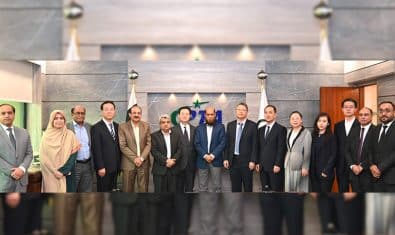A well educated population is vital to ensure a successful future. To harness the power of education and Information Technology, Higher Education Commission of Pakistan has launched a countrywide education alliance with the Microsoft.
In essence, the education alliance between HEC and Microsoft will provide centralized IT services to the universities and degree awarding institutes across Pakistan while maintaining the highest standards in the use of Information and Communication Technology across the higher education sector in Pakistan.
The alliance will consist of Faculty Connection, Microsoft Student Partner program, Imagine Cup, Technology Lab Integration, Students to Business interaction (S2B) portals and MSDN Academic Alliance. This will be achieved through the Architecture planning and deployment of Microsoft technology, on-going technical support to Higher Education Institutes (HEIs) and proactive guidance for Service Improvement.
Commenting on this major development in the country’s higher education sector, Kamal Ahmed, Country General Manager, Microsoft Pakistan, said,
“Microsoft believes that Information and Communications Technology (ICT), combined with education, provides the path to individuals, communities and nations to achieve their potential. The Education Alliance with HEC provides the framework for a comprehensive joint public/private implementation plan that supports Pakistan’s objective of achieving education excellence. It is aligned to the key strategic aims of transforming education, fostering local innovation and enabling jobs and opportunities.”
Discussing the merits of the alliance, Anwar Amjad, HEC’s Director IT, said,
“This is a great opportunity for institutions of higher learning in Pakistan to gain access to a broad spectrum of technology and enable the country to move towards a knowledge-based economy, ultimately benefiting the country through socio- economic development.”
A key objective of the alliance is to establish the basis of a long term, on-going partnership that will also allow for regular review and measurement to ensure that all activities of Microsoft within the educational programs remain aligned to the long term.
Since it is always fruitful for the state sector and private enterprise to work together to combine expertise, knowledge, experience and resources to ensure successful and sustainable education transformation, Microsoft will help the HEC and HEIs to attain their goals by transforming education, fostering local innovation and creating jobs and opportunities through this alliance.
This blends perfectly with the HEC’s stated objective of equipping university students and faculty with the latest technological access across Pakistan. The HEC is also committed to bridging the digital divide by bringing Pakistan at par with the developed nations of the world where technology enablement for the students is concerned.


























This is very good alliance. I hope it will make standard of education better in Pakistan.
Get them young… So that when they go into the corporate world, they’ll insist on using your products.
… which will result in hefty software licensing fees.
I would love to hear Google Pakistan rep’s views on this.
The HEC has no role to force the technologies. These MOUs typically do not allow or even envisage the teaching and learning of alternative technologies that are in use in Pakistan, many of which are mentioned below. The end result is only Microsoft applications will be taught in these universities/academies. So our future force is dependent on Microsoft only. There are critical pedagogical and economic problems with such a restriction.
1. Free and Open Source Software (FOSS) such as GNU/Linux, Open Office, Firefox have equivalent features as the Microsoft Windows, Microsoft Office and Internet Explorer applications being taught in these academies. Millions of people are using these FOSS applications all over the world and in Pakistan as well. The advantage of Free and Open Source Software (FOSS) is that being ‘free software’, the user is licensed to make copies and distribute the same, which is an important freedom for the teachers and students to avoid them) being compelled to spend considerable amounts of money procuring proprietary software for their own personal / home computers. It is also prudent to control the costs of subsequently upgrading the software in the computers installed in the universities/academies , as software by its nature is constantly subject to upgradation and improvement.
2. FOSS applications can also be modified – both maintained and extended by anybody, instead of being forced to go to only one vendor. In Pakistan, this is especially useful for local language extensions etc, which can be done by a much larger community of free software professionals, instead of waiting for releases from the vendor only. Thus learning ICTs acquires a new powerful dimension – of the learners being co-constructors using software as tools, instead of being ‘passive consumers’ of proprietary technologies.
3. In the interests of the pedagogical principle of diversity of learning, it is not desirable to force a single vendor’s ICT applications on teachers/students in Government universities/academies . It is our submission that curriculum design is the responsibility of the Government and cannot be solely determined by a private company. Under this program thus government funds are being used, and there will be a significant component of computers, peripherals and other related expenses, including on electricity, that will be directed solely towards this initiative.
4. Most importantly, Governments, by their very reach and mandate, have a key role in setting public standards. By the very act of adopting free and open technologies, the Government supports setting up of open standards, which supports the public good. By this, governments will be encouraging the use of FOSS. Use of FOSS at such a huge scale will help create a FOSS eco-system, which has enormous benefits to society at large, apart from all its direct benefits for the adopting government agencies